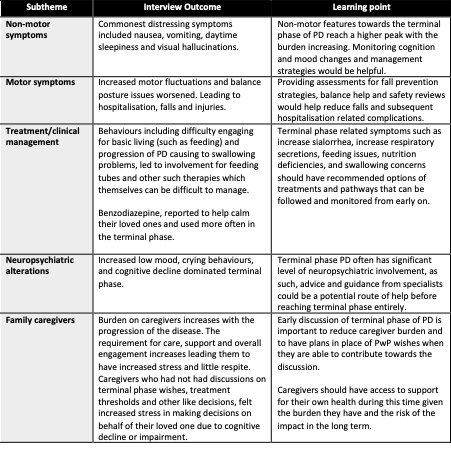Category: Palliative Care
Objective: We aim to identify clinical indicators and markers for timely referral, access, and need of PC in our PwP community, from the viewpoint of their caregivers.
Background: Parkinson’s disease (PD), being the commonest neurodegenerative progressive multi-complex syndrome, has been proposed to have a palliative care (PC) phase, whereby people with PD (PwP) have reduced response to treatment and cognitive decline, alongside worsening burden of their PD.
Method: Three centres (Italy, Netherlands, and UK) undertook discursive interviews with bereaved caregivers (BC) of PwP who have recently passed away. The interviews followed a series of 15 questions on topics ranging from documenting the wishes of PwP to end-of-life decisions.
Results: Across 3 sites, 16 BC of PwP undertook the interview. BC reported motor fluctuations and increased falls during later stages, leading to hospitalisation. Common nonmotor features ranged from nausea to sleep disturbance, however neuropsychiatric alterations dominated the terminal phase, which was challenging for BC at the time. Major behaviour changes, during the last 6 months, called for more supervision and consideration of advance options such as feeding tubes. Clinical management in the terminal phase was employing sedative medications, benzodiazepines, for keeping PwP calm. Additionally, the terminal phase saw an increased need for healthcare for recurrent infections, catheter management, and wounds. BC burden grew substantially during PC due to the need for constant engagement and care needs given the incapability for independent care. The final weeks of life were most challenging given the unexpected emergencies, physical needs and overall stress load that ensued. BC retrospective review of their time with their loved one all yielded the benefit of early discussion on wishes and plans to not have to shoulder this burden themselves.
Conclusion: This qualitative study with BC on their experience during their loved ones terminal phase of PD, shows the increase burden of care which occurs during this phase. Given, the progressive nature of PD, there remains lacking guidance and recommendations for healthcare professionals to help prepare PwP and caregivers for the terminal phase of PD. This study outlines the need for early discussions, plans and decisions on type of care, limits of care and overall wishes of PwP when able to contribute towards the discussion.
To cite this abstract in AMA style:
D. Trivedi, M. Qamar, V. Leta, M. Meinders, C. Münte, M. Groot, A. Antonini, M. Garon, K. Ray Chaudhuri. Palliative Care in Parkinson: a family caregiver’s view. A PD-PAL Consortium initiative. [abstract]. Mov Disord. 2023; 38 (suppl 1). https://www.mdsabstracts.org/abstract/palliative-care-in-parkinson-a-family-caregivers-view-a-pd-pal-consortium-initiative/. Accessed January 31, 2026.« Back to 2023 International Congress
MDS Abstracts - https://www.mdsabstracts.org/abstract/palliative-care-in-parkinson-a-family-caregivers-view-a-pd-pal-consortium-initiative/


